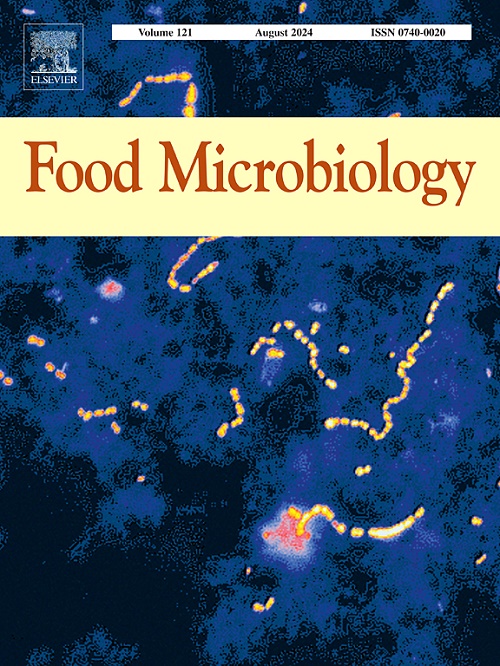The aprD-mutated strain modulates the development of Pseudomonas fragi population but has limited effects on the spoilage profiles of native residents
IF 4.5
1区 农林科学
Q1 BIOTECHNOLOGY & APPLIED MICROBIOLOGY
引用次数: 0
Abstract
Extracellular enzymes produced by predominant bacteria exert important roles in inducing and accelerating spoilage, with their secretion regulated by specific genes. In Pseudomonas fragi, the aprD gene is a recognized regulator for secreting an alkaline extracellular protease. However, limited studies have focused on this gene in P. fragi population and its impact on meat microbial community structure and function. This study addressed this gap by monitoring the changes in biological properties of P. fragi populations and analyzing the discrepancies in spoilage phenotypes and microbial community structures of chilled chicken among groups differentiated by the initial prevalence of aprD-positive strains. The results showed that aprD-positive strains were disseminated in P. fragi populations, and its prevalence was associated with significant increases in swimming motility and biofilm formation capacities in specific groups. In situ contamination experiments revealed varying spoilage characteristics and community compositions among groups by day 3 of storage. Correlation analysis demonstrated a strong association between spoilage phenotypes and certain bacterial genera, such as Pseudomonadaceae_Pseudomonas and Carnobacterium. However, the microbial community structure and spoilage characteristics of samples from each group were not significantly different on the 5th day of storage. These findings suggest that even a small number of aprD mutants can significantly affect the assembly of the chilled meat microbial community. Nonetheless, the regulatory effect of aprD on spoilage at the strain and population levels of P. fragi is negligible in the context of complex natural microbiota. This work underscores the complex interactions between specific bacterial genes and the broader microbial ecology in refrigerated meat environments, providing deeper insights into the meat spoilage mechanisms.

aprd突变菌株调节fragi假单胞菌种群的发展,但对当地居民的腐败概况影响有限
优势菌产生的胞外酶在诱导和加速腐败过程中发挥着重要作用,其分泌受特定基因的调控。在fragi假单胞菌中,aprD基因是一个公认的分泌碱性细胞外蛋白酶的调节因子。然而,关于该基因在fragi P.种群中的表达及其对肉类微生物群落结构和功能的影响的研究很少。本研究通过监测fragi P.菌群生物学特性的变化,并分析以aprd阳性菌株的初始流行率为区分标准的冷藏鸡的腐败表型和微生物群落结构的差异,解决了这一空白。结果表明,aprd阳性菌株在fragi P.种群中广泛传播,其流行与特定群体游泳运动能力和生物膜形成能力显著增加有关。原位污染试验表明,贮藏第3天各组间的腐坏特征和群落组成发生了变化。相关分析表明,腐败表型与某些细菌属(如Pseudomonadaceae_Pseudomonas和Carnobacterium)有很强的相关性。但在贮藏第5天,各组样品的微生物群落结构和腐败特征无显著差异。这些结果表明,即使少量的aprD突变体也会显著影响冰鲜肉微生物群落的聚集。然而,在复杂的天然微生物群背景下,aprD对fragi菌株和种群水平的腐败调节作用可以忽略不计。这项工作强调了特定细菌基因与冷藏肉类环境中更广泛的微生物生态之间的复杂相互作用,为肉类腐败机制提供了更深入的见解。
本文章由计算机程序翻译,如有差异,请以英文原文为准。
求助全文
约1分钟内获得全文
求助全文
来源期刊

Food microbiology
工程技术-生物工程与应用微生物
CiteScore
11.30
自引率
3.80%
发文量
179
审稿时长
44 days
期刊介绍:
Food Microbiology publishes original research articles, short communications, review papers, letters, news items and book reviews dealing with all aspects of the microbiology of foods. The editors aim to publish manuscripts of the highest quality which are both relevant and applicable to the broad field covered by the journal. Studies must be novel, have a clear connection to food microbiology, and be of general interest to the international community of food microbiologists. The editors make every effort to ensure rapid and fair reviews, resulting in timely publication of accepted manuscripts.
 求助内容:
求助内容: 应助结果提醒方式:
应助结果提醒方式:


